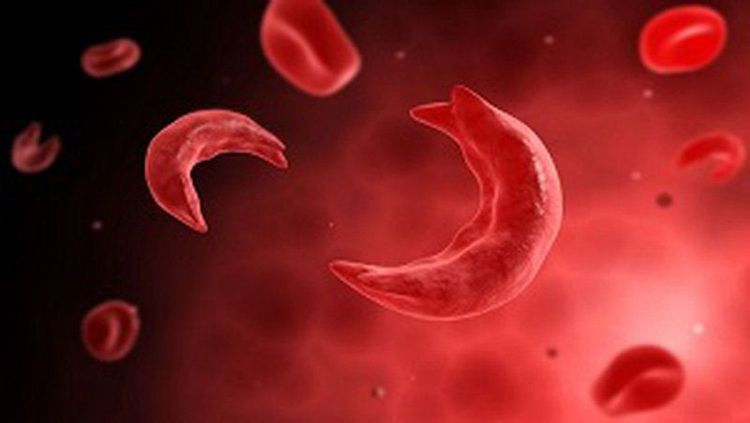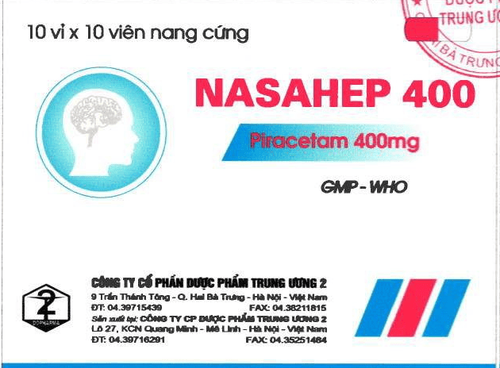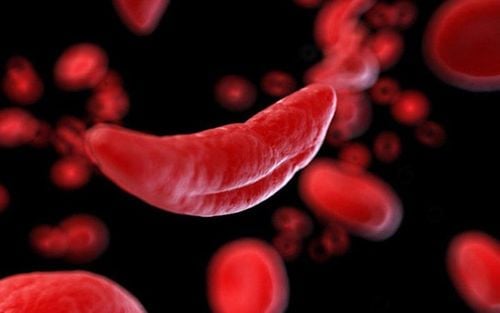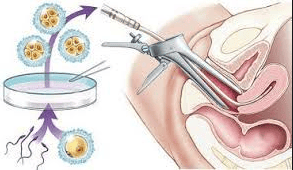This is an automatically translated article.
Sickle cell disease is an inherited red blood cell disorder. This condition changes the shape of red blood cells into a sickle shape, affecting the blood's ability to carry oxygen, which can lead to many dangerous complications. However, there is also a condition that carries the sickle cell gene but has no symptoms.1. What is sickle cell genetics?
The sickle cell trait (SCT) is an inherited blood disorder. That means it is inherited or passed from parent to child. The sickle cell trait is different from sickle cell disease (SCD) and in fact it is not considered a disease.People with sickle cell disease (SCD) have crescent-shaped blood cells (crescent moon) caused by an abnormal version of a protein called hemoglobin. They often have a lot of pain and other symptoms.
Sickle cell disease (SCD) is the result of a damaged hemoglobin gene. Hemoglobin is the oxygen carrier inside red blood cells. You need two copies of this defective gene, one from your father and one from your mother, to get sickle cell disease.
Doctors call this an autosomal recessive inheritance. If both of your parents have the problem gene, you have a 1 in 4 chance of being born with the condition.
Having the sickle cell (SCT) gene means you inherited the sickle gene from one (not both) of your parents and most of your red blood cells are normal. Very rarely people with SCT have any symptoms, most lead normal lives.
People with SCT have one normal hemoglobin gene (“A”) and one abnormal hemoglobin gene (“S”). That's why you sometimes see it called HbAS. If both of your parents carry the sickle cell trait, you have a 50% chance that only one of them will pass the gene on to you. If that happens, you will have the sickle cell gene.
2. Sickle cell genetic symptoms
People who carry the sickle cell gene are not likely to have symptoms of sickle cell disease.Sickle cell disease is marked by abnormally shaped red blood cells (RBCs), which can lead to severe pain. Healthy red blood cells are round or disc-shaped and move easily through your small blood vessels.
Whereas crescent-shaped blood cells are stiff and not as flexible as normal red blood cells. They can get stuck in small blood vessels and cause blockages, pain, and other problems like infections and strokes. They can also lead to a potentially deadly complication called acute chest syndrome, which makes it hard to breathe.
People with SCT mostly have normal red blood cells, so they don't usually have these serious problems.
Sometimes people with the inherited sickle cell gene also have symptoms, but it's very rare. These may include:
Blood in your urine. While this is not always a serious problem, you should see your doctor to make sure that nothing more serious, such as kidney problems, is going on. Pain at altitude. Difficulty exercising in inclement weather. Some people with the sickle cell genetics may be more susceptible to heat stroke or at risk after intense exercise than others. This is especially true in extreme hot or cold weather conditions. Athletes and military cadets with the sickle cell gene are most likely to develop these health problems.
If you have SCT and are exercising intensely, take these steps to avoid any potential problems:
Stay hydrated: Drink water before, during, and after heavy activity. Stay cool: Prevent overheating in hot and humid weather by misting or resting in an air-conditioned area. Move yourself during exercise. Start slowly and then build intensity. Take frequent breaks or rest during workouts. Seek medical help right away if you start to feel sick.

Những người mang gen hồng cầu hình liềm không có triệu chứng giống người mắc bệnh
3. Causes and risk factors of sickle cell inheritance
More than 100 million people worldwide have the sickle cell gene. About 1 in 12 African Americans and 1 in 100 Hispanic Americans are born with this condition. It is also common in people of human ancestry in:Mediterranean: Countries like Turkey, Greece and Italy. Middle East: Countries like Saudi Arabia. Asia: Countries like India and Japan Central and South America: Countries like Brazil and Costa Rica The sickle cell trait (SCT) is inherited through families. If your parents had this trait, you could have sickle cell disease (SCD), or you could just "carry" the gene (SCT) and never have symptoms.
If you have SCT, there is a chance that you could pass the defective gene on to your child. SCT is not a serious condition, but SCD is. It's important to know whether you and your partner both have the sickle cell gene. If both have this gene, there is a 25% chance of having a baby with sickle cell disease in each pregnancy. 25% chance of having a baby with no trait or disease (normal genes). 50% chance of having a baby with sickle cell trait.
4. Sickle cell genetic diagnosis
Your doctor may order a blood test to see if you carry the sickle cell gene. Prenatal testing can tell if your baby has sickle cell disease or carries the sickle cell gene.If you know or think you may have the sickle cell gene and want to start a family, you should talk to a genetic counselor. These specialists have experience in inherited blood disorders and specialize in prenatal genetic counseling.
They can help you find out if SCD and SCT run in your family and if there is a risk of bringing abnormal genes to your child. Both you and your partner should be tested for sickle cell genetics if you are planning to have children.
5. Can the inherited sickle cell gene condition be treated?
There is no specific treatment for a sickle cell genetic condition because most cases are asymptomatic. Treatment will focus on symptoms or complications that are rare in people with this condition.
Đến hiện tại, người mang gen hồng cầu hình liềm không có phương pháp điều trị cụ thể
6. Is there a way to prevent the sickle cell genetic condition?
Prevention of sickle cell traits centered around people with sickle cell disease or making informed decisions with their partners and the help of a genetic counselor with family planning .Sickle cell carriers can avoid rare symptoms and problems by being aware of dangerous situations and taking precautions when considering exercise , hiking, flying, scuba diving and other extreme activities.
7. Complications of sickle cell genetic condition
The sickle cell genetic condition is not a mild form of sickle cell disease and can never become sickle cell disease. But this trait can make you more likely to get certain types of kidney cancer and kidney disease, or pass urine with blood.This condition can also increase the risk of blood clots. Athletes and those participating in harsh military training should take extra precautions, like drinking extra fluids and taking frequent breaks.
In some rare and serious cases, people with the sickle cell gene may experience complications such as:
Pain similar to those of sickle cell disease. Spleen infarction is caused by a lack of oxygen in your spleen. This may be the result of strenuous exercise at altitudes above 5,000 feet. Symptoms include nausea, vomiting, and pain in the chest and abdomen. Get medical help right away if you have these problems. Sudden death: People with the sickle cell genetics should be careful in situations of increased barometric pressure (such as scuba diving), low oxygen, high altitude, and dehydration. You can also pass the sickle cell gene to your children.
If you have a need for consultation and examination at Vinmec Hospitals under the national health system, please book an appointment on the website (vinmec.com) for the best service.
Please dial HOTLINE for more information or register for an appointment HERE. Download MyVinmec app to make appointments faster and to manage your bookings easily.













